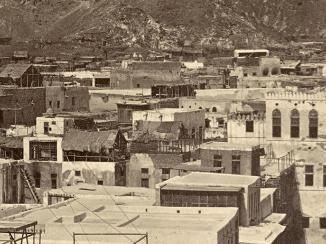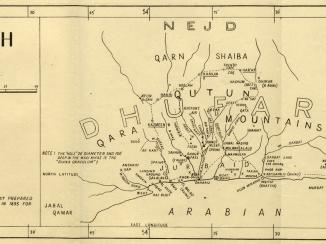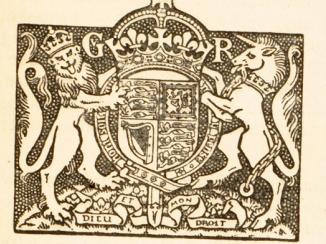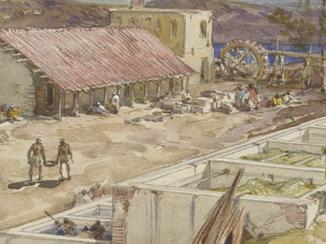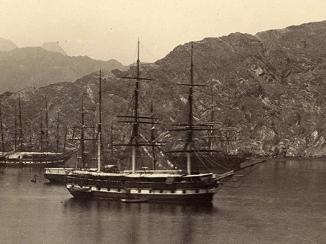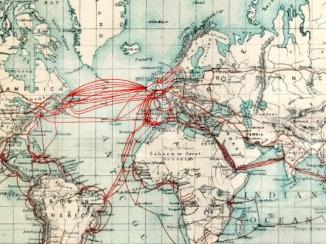‘File 5/190 III Manumission of slaves at Muscat: individual cases’
IOR/R/15/1/217
728 items in this record
Search within this record
The record is made up of One volume (353 folios). It was created in 11 Mar 1929-32 Dec 1932. It was written in English and Arabic. The original is part of the British Library: India Office The department of the British Government to which the Government of India reported between 1858 and 1947. The successor to the Court of Directors. Records and Private Papers Documents collected in a private capacity. .
About this record
- Content
The volume contains thirty-nine manumission subjects, each one involving the manumission request of one or more slaves, who had sought refuge at the Political Agency An office of the East India Company and, later, of the British Raj, headed by an agent. in Muscat (then under the charge of Major G. Murphy). Each manumission case follows a very similar pattern. Murphy sent a copy of the slave‘s manumission certificate (with covering letter) for the attention of the Secretary to the Political Resident A senior ranking political representative (equivalent to a Consul General) from the diplomatic corps of the Government of India or one of its subordinate provincial governments, in charge of a Political Residency. , making his own recommendation as to whether manumission should be given. In most cases, the Secretary to the Political Residency An office of the East India Company and, later, of the British Raj, established in the provinces and regions considered part of, or under the influence of, British India. responded by agreeing to the manumission request. In the case of slaves who had been kept in the Trucial Coast A name used by Britain from the nineteenth century to 1971 to refer to the present-day United Arab Emirates. towns (Dubai, Sharjah, Abu Dhabi), a copy of the manumission statement was forwarded by the Secretary to the Political Resident A senior ranking political representative (equivalent to a Consul General) from the diplomatic corps of the Government of India or one of its subordinate provincial governments, in charge of a Political Residency. to the Residency An office of the East India Company and, later, of the British Raj, established in the provinces and regions considered part of, or under the influence of, British India. Agent in Sharjah (‘Īsá bin ‘Abd al-Latif), who was asked to make enquiries as to the validity of the slave’s statement.
A small number of the manumission cases are more complex. In July 1931, the Political Residency An office of the East India Company and, later, of the British Raj, established in the provinces and regions considered part of, or under the influence of, British India. heard of a slave who had had his right hand cut off and been imprisoned at the decree of the shaikh of Dubai, after having been accused of theft (folio 195). Enquiries made by ‘Īsá bin ‘Abd al-Latif suggested that the slave was caught in the act of robbery. A medical certificate from the Agency An office of the East India Company and, later, of the British Raj, headed by an agent. Hospital in Muscat verified the extent and recent nature of the punishment meted out on the slave (folio 199). The Political Resident A senior ranking political representative (equivalent to a Consul General) from the diplomatic corps of the Government of India or one of its subordinate provincial governments, in charge of a Political Residency. (Lieutenant-Colonel Hugh Biscoe) wrote to the Residency An office of the East India Company and, later, of the British Raj, established in the provinces and regions considered part of, or under the influence of, British India. Agent (folio 215) to protest in the strongest terms to the shaikh of Dubai about the severity of the punishment handed out to the slave, insisting that imprisonment was the usual punishment in this day.
Another case was brought to the attention of the Secretary to the Political Resident A senior ranking political representative (equivalent to a Consul General) from the diplomatic corps of the Government of India or one of its subordinate provincial governments, in charge of a Political Residency. by the Political Agent A mid-ranking political representative (equivalent to a Consul) from the diplomatic corps of the Government of India or one of its subordinate provincial governments, in charge of a Political Agency. Muscat in June 1932, in which a pearl diver from Umm-al-Qaiwain, who claimed to be a slave, requested manumission. ‘Īsá bin ‘Abd al-Latif agreed with the manumission request, commenting that, because the demand for and price of pearls had decreased considerably in recent years, many divers had become heavily indebted. He advised that, once the slave had been given his manumission certificate, he should return to Sharjah to enable the Residency An office of the East India Company and, later, of the British Raj, established in the provinces and regions considered part of, or under the influence of, British India. Agent to carry out the necessary enquiries relating to the slave’s debt (said to be 520 rupees Indian silver coin also widely used in the Persian Gulf. ) in the Diving Court. Another manumission request was made by a slave who was kept at Kalba, near Muscat. The Political Resident A senior ranking political representative (equivalent to a Consul General) from the diplomatic corps of the Government of India or one of its subordinate provincial governments, in charge of a Political Residency. requested that, in future, the Political Agent A mid-ranking political representative (equivalent to a Consul) from the diplomatic corps of the Government of India or one of its subordinate provincial governments, in charge of a Political Agency. at Muscat treats affairs (including slaves) in Kalba, as the Political Agent A mid-ranking political representative (equivalent to a Consul) from the diplomatic corps of the Government of India or one of its subordinate provincial governments, in charge of a Political Agency. Bahrain treats affairs in Qatar.
- Extent and format
- One volume (353 folios)
- Arrangement
The volume has been arranged in chronological order, with the earliest manumission subject at the beginning of the book, and the latest at the end. At the front of the book (ff.2-4) is a handwritten index listing all manumission subjects contained within. The subjects are numbered 1 through to 40. Subject 23 is not present in the volume, having been removed by Residency An office of the East India Company and, later, of the British Raj, established in the provinces and regions considered part of, or under the influence of, British India. staff for the Resident to take on tour at the time the correspondence was being compiled.
- Physical characteristics
Foliation: The volume has been foliated with a circled number in the top-right corner of each recto The front of a sheet of paper or leaf, often abbreviated to 'r'. , from the title sheet to the last folio of the volume. An earlier foliation system has been used on each manumission case, expressed as page x of y pages, written in pencil in the top-right corner of each recto The front of a sheet of paper or leaf, often abbreviated to 'r'. . A very small number of these internal numbering systems do not run in the correct numerical sequence, suggesting that items were bound in the incorrect order.
- Written in
- English and Arabic in Latin and Arabic script
- Type
- Archival file
Archive information for this record
- Original held at
- British Library: India Office The department of the British Government to which the Government of India reported between 1858 and 1947. The successor to the Court of Directors. Records and Private Papers Documents collected in a private capacity.
- Access conditions
Unrestricted
- Archive reference
- IOR/R/15/1/217
- Former external reference(s)
- A series: 5/190 III
- Date(s)
- 11 Mar 1929-32 Dec 1932 (CE, Gregorian)
- Context of creation
The Political Agent A mid-ranking political representative (equivalent to a Consul) from the diplomatic corps of the Government of India or one of its subordinate provincial governments, in charge of a Political Agency. at Muscat was required to pass all manumission requests on to the Political Residency An office of the East India Company and, later, of the British Raj, established in the provinces and regions considered part of, or under the influence of, British India. , along with their own recommendation on the case. All slave manumission requests were assessed according the Guidelines for Manumission, drawn up in 1913 by former Political Resident A senior ranking political representative (equivalent to a Consul General) from the diplomatic corps of the Government of India or one of its subordinate provincial governments, in charge of a Political Residency. of the Persian Gulf The historical term used to describe the body of water between the Arabian Peninsula and Iran. Percy Cox. In the case of Muscat, the guidelines stipulated that for slaves requesting manumission in that place, granting of a manumission certificate can only be done with the acquiescence of the Sultan of Muscat, after investigation by his Highness and the Political Agent A mid-ranking political representative (equivalent to a Consul) from the diplomatic corps of the Government of India or one of its subordinate provincial governments, in charge of a Political Agency. , the reason for this procedure being that the Sultan of Muscat was not party to the Brussels Act of 1890. In July 1931, the Political Residency An office of the East India Company and, later, of the British Raj, established in the provinces and regions considered part of, or under the influence of, British India. authorised the Political Agent A mid-ranking political representative (equivalent to a Consul) from the diplomatic corps of the Government of India or one of its subordinate provincial governments, in charge of a Political Agency. Muscat to make the final decisions on straightforward manumission requests. However, more complicated cases, or cases involving slavery on the Trucial Coast A name used by Britain from the nineteenth century to 1971 to refer to the present-day United Arab Emirates. , were still directed to the attention of the Political Residency An office of the East India Company and, later, of the British Raj, established in the provinces and regions considered part of, or under the influence of, British India. .
Access & Reference
History of this record
Related search terms
- Places
- MuscatAl-Hasa
- People & organisations
- Muscat Political Agency and ConsulateSecretary to the Political Resident in the Persian Gulf
Use and share this record
- Share this record
- Cite this record in your research
‘File 5/190 III Manumission of slaves at Muscat: individual cases’, British Library: India Office Records and Private Papers, IOR/R/15/1/217, in Qatar Digital Library <https://www.qdl.qa/archive/81055/vdc_100000000193.0x0000be> [accessed 23 April 2024]
- Link to this record
https://www.qdl.qa/en/archive/81055/vdc_100000000193.0x0000be
- IIIF details
This record has a IIIF manifest available as follows. If you have a compatible viewer you can drag the icon to load it.https://www.qdl.qa/en/iiif/81055/vdc_100000000193.0x0000be/manifestOpen in Universal viewerOpen in Mirador viewerMore options for embedding images
Copyright: How to use this content
- Reference
- IOR/R/15/1/217
- Title
- ‘File 5/190 III Manumission of slaves at Muscat: individual cases’
- Pages
- 44r:45v
- Author
- Thomas, Bertram Sidney
- Usage terms
- The copyright status is unknown. Please contact copyright@bl.uk with any information you have regarding this item.
- Reference
- IOR/R/15/1/217
- Title
- ‘File 5/190 III Manumission of slaves at Muscat: individual cases’
- Pages
- 201ar:201av
- Author
- Āl Maktūm, Shaikh Mana bin Rāshid
- Usage terms
- The copyright status is unknown. Please contact copyright@bl.uk with any information you have regarding this item.
- Reference
- IOR/R/15/1/217
- Title
- ‘File 5/190 III Manumission of slaves at Muscat: individual cases’
- Pages
- 208r:208v
- Author
- Āl Maktūm, Shaikh Saʻīd bin Maktūm bin Hasher
- Usage terms
- Public Domain
- Reference
- IOR/R/15/1/217
- Title
- ‘File 5/190 III Manumission of slaves at Muscat: individual cases’
- Pages
- 209r:209v
- Author
- Salam, Muhammad bin Abdus
- Usage terms
- The copyright status is unknown. Please contact copyright@bl.uk with any information you have regarding this item.
- Reference
- IOR/R/15/1/217
- Title
- ‘File 5/190 III Manumission of slaves at Muscat: individual cases’
- Pages
- front, back, spine, edge, head, tail, front-i, i-r:ii-v, 1r:43v, 46r:207v, 210r:353v, iii-r:vi-v, back-i
- Author
- East India Company, the Board of Control, the India Office, or other British Government Department
- Usage terms
- Open Government Licence
























































































































































































































































































































































































































































































































































































































































































































































